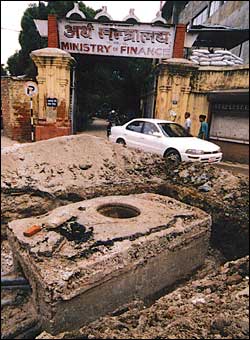 Only three weeks into his new job, Finance Minister Prakash Chandra Lohani is trying to see if he can plug the hole in the forthcoming national budget. He may have to start with the huge hole on the street outside his ministry (see pic, right).
Only three weeks into his new job, Finance Minister Prakash Chandra Lohani is trying to see if he can plug the hole in the forthcoming national budget. He may have to start with the huge hole on the street outside his ministry (see pic, right).
Lohani has his work cut out: the government's security budget has grown four-fold to Rs 9 billion in the past four years, revenue is up but still below target, export earnings and tourism are down. If it wasn't for the estimated $1 billion that came into the country from overseas remittances last year, this country could be declared officially bankrupt.
Lohani is caught in a Catch-22: more money than ever before is needed for development, but more of it is being siphoned off for security. The army says it needs to augment hardware to deter insurgents from going back to war. On top of that, chronic fiscal ailments and structural problems all persist.
Even so, Finance Ministry officials see a silver lining: revenue has grown by 10 percent compared to last year and is now only Rs 3 billion less than the regular expenditure. Lohani is confident balancing the budget is within reach. "We will increase revenue further and cut some more from the regular expenditure this year," he told us.
If that works, the government will not need to rely on internal borrowing that grew by 24 percent last year in direct violation of the Nepal Rastra Bank Act which caps internal borrowing to only five percent of the budget.
The security situation has meant that a large chunk of the budget in this fiscal year has not been spent, which does not mean that the need is not great. (See: 'Still standstill', #145). The World Bank, International Monetary Fund and the Asian Development Bank and some bilateral donors are shoring up the development budget by injecting some Rs 7 billion this year. "We have an improved scenario vis-?-vis the development budget," says Shankar Raj Sharma at the National Planning Commission. "And if the peace holds, we can improve implementation."
And that is the big "if". Lohani's plans for an investment-friendly and job-creating budget also hinge on peace and political stability. If this week's isolated skirmishes between the military and the Maoists escalate, or the street agitation intensifies, his plans won't be worth much.
 This year, the budget faces the same fiscal constraints of the past. Ineffective VAT collection is one of the biggest setbacks in improving revenue. "Regulating VAT billing remains the top challenge," admits Badri Prasad Shrestha, the previous finance minister who was working on the budget he thought he would get to present, but had to hand over to Lohani. VAT contributes only three percent of Nepal's GDP, while income tax represents barely two percent. The slight increase in revenue compared to last year is not enough to cover the Defence Ministry's demand to add Rs 2 billion to its budget this year. The extra money will be used to buy aircraft and equipment and recruit soldiers, says Defence Secretary Madan Prasad Aryal. "We need to upgrade our defence capability, but let's see what Finance says." We put that to Lohani, who replied: "It will go up, but we can't compromise on security."
This year, the budget faces the same fiscal constraints of the past. Ineffective VAT collection is one of the biggest setbacks in improving revenue. "Regulating VAT billing remains the top challenge," admits Badri Prasad Shrestha, the previous finance minister who was working on the budget he thought he would get to present, but had to hand over to Lohani. VAT contributes only three percent of Nepal's GDP, while income tax represents barely two percent. The slight increase in revenue compared to last year is not enough to cover the Defence Ministry's demand to add Rs 2 billion to its budget this year. The extra money will be used to buy aircraft and equipment and recruit soldiers, says Defence Secretary Madan Prasad Aryal. "We need to upgrade our defence capability, but let's see what Finance says." We put that to Lohani, who replied: "It will go up, but we can't compromise on security."
As if that were not enough, the government is burdened with maturing foreign loans the country borrowed almost 50 years ago. "Finance ministers are often not bothered about such loans because they have longer grace periods," says economist Bishwamber Pyakurel. "But sooner or later, we have to pay them back." Debt servicing already eats up seven percent of the regular budget, and now that it is time to pay the principle the strain will show.
The World Bank and the IMF are stepping in with nearly $70 million each to bail us out through their Poverty Reduction Strategy and the Poverty Reduction and Growth Facility. But there are strict conditions: effective implementation of reforms, privatisation and trimming the bureaucracy. These are conditions that the presently shaky Thapa administration may find too risky to push.
The two lenders also want Lohani to keep to the budget that Badri Shrestha was working on. "Before finalising our aid for the PRGF, we will confirm if the budget comes out the same way we had agreed upon with the last government," Sukhwinder Singh of the IMF's Nepal office told us. Since the World Bank is working closely with IMF in the poverty reduction scheme, it will certainly follow suit.


